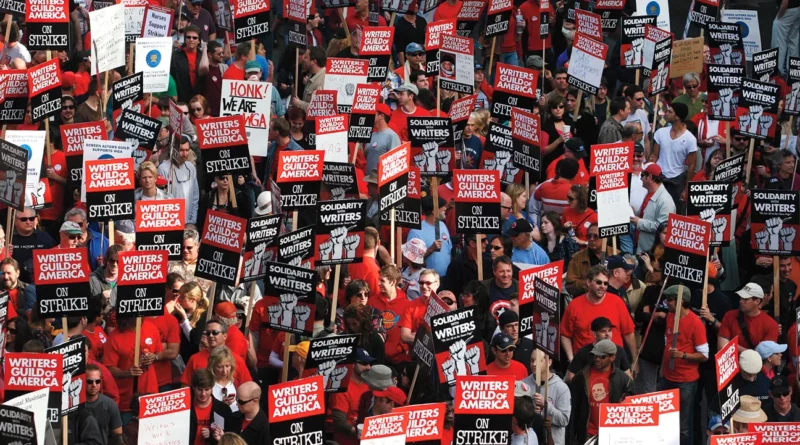Opinion: The WGA and SAG-AFTRA strike, AI and journalism
Photo credit Matthew Simmons for WireImage
Luke Osciak | Managing Editor
Update: This story was originally written for publication in our Sept. print issue. As of Sept. 24, the strike has concluded with an agreement between the Writers Guild of America and the Alliance of Motion Picture and Television Producers.
Since May 2, the Writers Guild of America has been on strike. On July 14, the American Federation of Television and Radio Artists joined the WGA to start a historic, dual strike on Hollywood. On Friday, the strike reached its 144th day with only a few more days left until it became the longest strike in the union’s history. Negotiations are being decided and Hollywood studios are showing interest in ending the strike.
Though until I see the negotiations, I will continue supporting WGA and SAG-AFTRA in their strike. What makes this strike feel personal to myself and others, is that the strike directly targets one of the most dangerous inventions of the modern age, A.I.
Since the start of the year, it has felt like A.I. has moved at a break-neck pace. I saw it progress from the viral DALL-E mini photo generator to a few months later seeing my peers fail assignments because they used A.I.
Any individual now has the ability to use A.I. in a variety of ways. The technology has spread quickly to an incredible amount of industries in the last few months. Which is why this strike comes at such an important moment. It comes at a watershed moment.
Actor and writer Johnathan McClain, expressed this feeling when he said on the picket lines, “But I feel on some level we are, as far as this tech conversation is concerned, a little bit of a canary in a coal mine. This is an important moment and we’ve got to really make a decisive stand.”
This moment in Hollywood encapsulates a variety of feelings that all humans have about A.I in the current age. The writers are upset that the quality of their working conditions is abysmal. They are upset that their middle-class job is now barely enough to afford the cost of living in Los Angeles. They are upset that companies like Netflix, have no legal right to report the viewing numbers of the shows these people made. The appeal of a company using A.I. is only going to keep being more appealing to these companies unless they are held accountable.
In journalism, all writers are told to follow a basic style that is easy to learn. Journalism started out as a blue-collar job. Anyone could learn the style and begin to write articles. It is made for the “everyman”, because it is read by everyone.
I see journalism as one of the primary markets where A.I. can be implemented. It won’t happen soon, but I am scared of the changes AI could make to journalism when I graduate.
David Caswell in his article “AI and journalism: What’s Next,” identifies this time as “placed journalism at the cusp of significant change, variously equated to the iPhone moment, the birth of the internet and even the appearance of the printing press.”
I think of all the recipe articles that an A.I. could recreate by feeding the ingredients list and the instructions, and the breaking news report that only has a few lines of text. All of these pieces of information that people are paid to write will go to an A.I. that can get it done faster and cheaper.
To take a stand against A.I. is to take solidarity with our fellow workers. We live in a different time than the years when the writers guild has previously gone on strike. A world where there is more vocal support for workers, and increased media presence.
“This guild is older and wiser in many ways, but it’s younger and more passionate and it’s more connected and it’s faster on its feet. And my god, we have a media landscape with a press that’s actually willing to report our story with interest and with accuracy for the first time in history.” said “Star Wars Andor’s” showrunner Tony Gilroy in a speech given on the picket lines.
If the WGA-AFTRA strike is to come close, I hope that it makes people realize that there is more human effort put into the creation of art than anything an AI can provide. That to use A.I. is to be somewhat complicit in the exploitation of workers. There have been countless Sci-fi movies where A.I. takes over the world. It’s an old trope that has always been a fantasy, but today it might happen. However the WGA and SAG-AFTRA strike, gives just a strong enough fighting chance for workers to show how important we are.
Read more opinion articles at https://flyernews.com/opinion/

